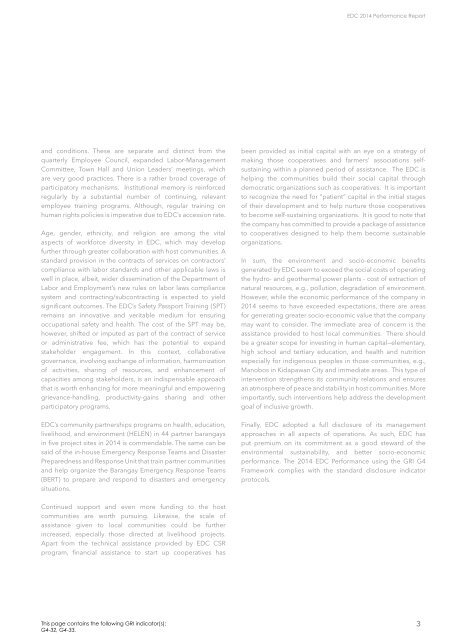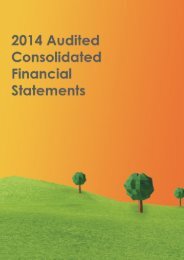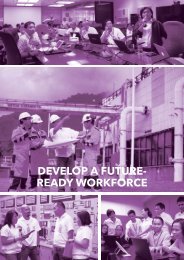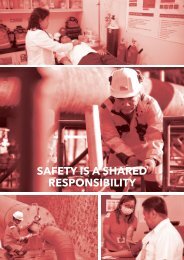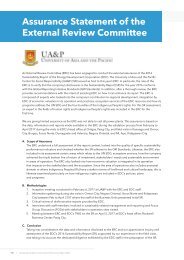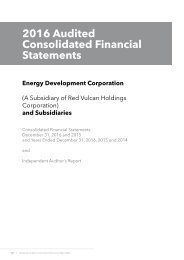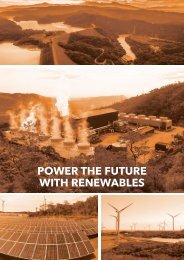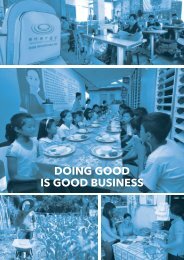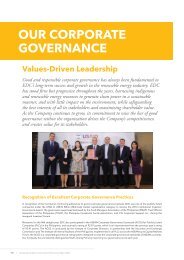2014 External Assurance
You also want an ePaper? Increase the reach of your titles
YUMPU automatically turns print PDFs into web optimized ePapers that Google loves.
EDC <strong>2014</strong> Performance Report<br />
and conditions. These are separate and distinct from the<br />
quarterly Employee Council, expanded Labor-Management<br />
Committee, Town Hall and Union Leaders’ meetings, which<br />
are very good practices. There is a rather broad coverage of<br />
participatory mechanisms. Institutional memory is reinforced<br />
regularly by a substantial number of continuing, relevant<br />
employee training programs. Although, regular training on<br />
human rights policies is imperative due to EDC’s accession rate.<br />
Age, gender, ethnicity, and religion are among the vital<br />
aspects of workforce diversity in EDC, which may develop<br />
further through greater collaboration with host communities. A<br />
standard provision in the contracts of services on contractors’<br />
compliance with labor standards and other applicable laws is<br />
well in place, albeit, wider dissemination of the Department of<br />
Labor and Employment’s new rules on labor laws compliance<br />
system and contracting/subcontracting is expected to yield<br />
significant outcomes. The EDC’s Safety Passport Training (SPT)<br />
remains an innovative and veritable medium for ensuring<br />
occupational safety and health. The cost of the SPT may be,<br />
however, shifted or imputed as part of the contract of service<br />
or administrative fee, which has the potential to expand<br />
stakeholder engagement. In this context, collaborative<br />
governance, involving exchange of information, harmonization<br />
of activities, sharing of resources, and enhancement of<br />
capacities among stakeholders, is an indispensable approach<br />
that is worth enhancing for more meaningful and empowering<br />
grievance-handling, productivity-gains sharing and other<br />
participatory programs.<br />
EDC’s community partnerships programs on health, education,<br />
livelihood, and environment (HELEN) in 44 partner barangays<br />
in five project sites in <strong>2014</strong> is commendable. The same can be<br />
said of the in-house Emergency Response Teams and Disaster<br />
Preparedness and Response Unit that train partner communities<br />
and help organize the Barangay Emergency Response Teams<br />
(BERT) to prepare and respond to disasters and emergency<br />
situations.<br />
been provided as initial capital with an eye on a strategy of<br />
making those cooperatives and farmers’ associations selfsustaining<br />
within a planned period of assistance. The EDC is<br />
helping the communities build their social capital through<br />
democratic organizations such as cooperatives. It is important<br />
to recognize the need for “patient” capital in the initial stages<br />
of their development and to help nurture those cooperatives<br />
to become self-sustaining organizations. It is good to note that<br />
the company has committed to provide a package of assistance<br />
to cooperatives designed to help them become sustainable<br />
organizations.<br />
In sum, the environment and socio-economic benefits<br />
generated by EDC seem to exceed the social costs of operating<br />
the hydro- and geothermal power plants - cost of extraction of<br />
natural resources, e.g., pollution, degradation of environment.<br />
However, while the economic performance of the company in<br />
<strong>2014</strong> seems to have exceeded expectations, there are areas<br />
for generating greater socio-economic value that the company<br />
may want to consider. The immediate area of concern is the<br />
assistance provided to host local communities. There should<br />
be a greater scope for investing in human capital—elementary,<br />
high school and tertiary education, and health and nutrition<br />
especially for indigenous peoples in those communities, e.g.,<br />
Manobos in Kidapawan City and immediate areas. This type of<br />
intervention strengthens its community relations and ensures<br />
an atmosphere of peace and stability in host communities. More<br />
importantly, such interventions help address the development<br />
goal of inclusive growth.<br />
Finally, EDC adopted a full disclosure of its management<br />
approaches in all aspects of operations. As such, EDC has<br />
put premium on its commitment as a good steward of the<br />
environmental sustainability, and better socio-economic<br />
performance. The <strong>2014</strong> EDC Performance using the GRI G4<br />
Framework complies with the standard disclosure indicator<br />
protocols.<br />
Continued support and even more funding to the host<br />
communities are worth pursuing. Likewise, the scale of<br />
assistance given to local communities could be further<br />
increased, especially those directed at livelihood projects.<br />
Apart from the technical assistance provided by EDC CSR<br />
program, financial assistance to start up cooperatives has<br />
This page contains the following GRI indicator(s):<br />
G4-32, G4-33.<br />
3


